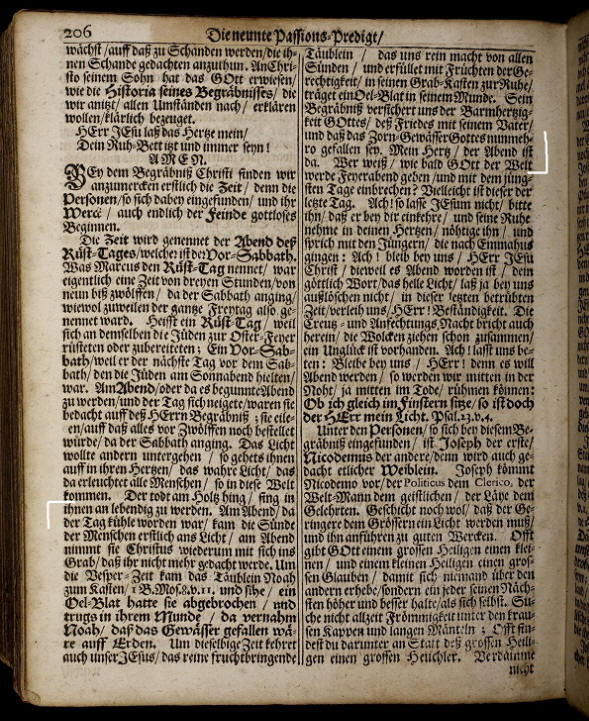Am Abend da es khle war...
The text from the ARIOSO is a fine example of the way christians in the 17-18th century read the Bible and by almost at random (word-association: allegory, typology) combining texts from the 66/72 books of the Bible created a new layer of meaning. This network of words and phrases produces meaning that is not 'really' (= historical, literal) there, but it works. They are specimina of a now almost lost spirituality.
On the left an extract from the text from Heinrich Mller Hertzensspiegel [Meditations on the gospel of every sunday in the liturgical year, to which are added his very popular Passionspredigten, 8 (or even 9) sermons on particular moments in Jesus PassionJ, on the right Picander's text (arioso, St-Matthews Passion). It is obvious that in this case Picander did no more than 'poetising' the prosetext of Mller from the ninth sermon on Jesus passion (p. 206 in the 1732 edition I consulted, see below for an image). Just read both and you will agree. Surprisingly one of Bach's earlier librettists, Salomo Franck (Weimar) also used Mller to transform this meditation into a poem. NB: reading the arioso with these texts in mind, not only the intertext becomes more evident, but also the interpretation of the third line becomes unequivocally clear: Am Abend drcket ihn der Heiland nieder = In the evening, the Saviour subdued him (= the old Adam, the sinner). All three texts can be read herea>
Source: Renate Axmacher, AUS LIEBE WILL MEIN HEILAND STERBEN. Untersuchungen zum Wandel des Passionsverstndnisses im frhen 18.Jahrhundert (1984), p.180-181
for more texts, click here
| Am Abend, da der Tag khle worden
war, kam die Snde der Menschen erstlich
ans Licht, am Abend nimmt sie Christus
wieder mit sich ins Grab, da ihr nicht
mehr gedacht werde. Um die Vesper-Zeit
kam das Tublein Noah zum Kasten, und
siehe, ein Oel-Blat hatte sie abgebrochen,
und trugs in ihrem Munde, da vernahm
Noah, da das Gewsser gefallen wre
auff Erden. I. B. Mos. 8,11. Um dieselbe Zeit kehrt auch unser Jesus, das reine, fruchtbringende Tublein, das uns rein macht von allen Snden, und erfllet mit Frchten der Gerechtigkeit, in seinen Grab-Kasten zur Ruhe, trgt ein Oel-Blat in seinem Munde. Sein Begrbni versichert uns der Barmhertzigkeit Gottes, des Friedens mit seinem Vater, und da das Zorn-Gewsser nunmehr gefallen sey. Mein Hertz, der Abend ist da ..... Ach, so lasse Jesum nicht, bitte ihn, da er bey dir einkehre, und seine Ruhe nehme in deinem Hertzen ... |
Am Abend da es khle war, Ward Adams Fallen offenbar, Am Abend drcket ihn der Heyland nieder. Am Abend kam die Taube wieder, Und trug ein Oel-Blatt in dem Munde. O, schne Zeit, o, Abend-Stunde, Der Friedens-Schlu ist nun mit Gott gemacht, Denn Jesus hat sein Creutz vollbracht. Sein Leichnam kmmt zur Ruh, Ach liebe Seele bitte du, Geh, lasse dir den todten Jesum schencken, O, heylsames, o, kstlichs Angedencken. |
For those who can read Gothic German: here is the page from the 1732 print of Mllers Hertzensspiegel, p. 206 - click on the image to see the page in high resolution.
Dick Wursten (dick@wursten.be)

